Key takeaways:
- Vocal warm-ups are crucial for protecting vocal health, enhancing range, and boosting confidence during performances.
- Effective warm-up exercises include lip trills for breath control, humming for resonance, and tongue twisters for diction.
- Creating a personalized warm-up routine that adapts to daily vocal needs and includes hydration and mindfulness can greatly improve vocal performance.
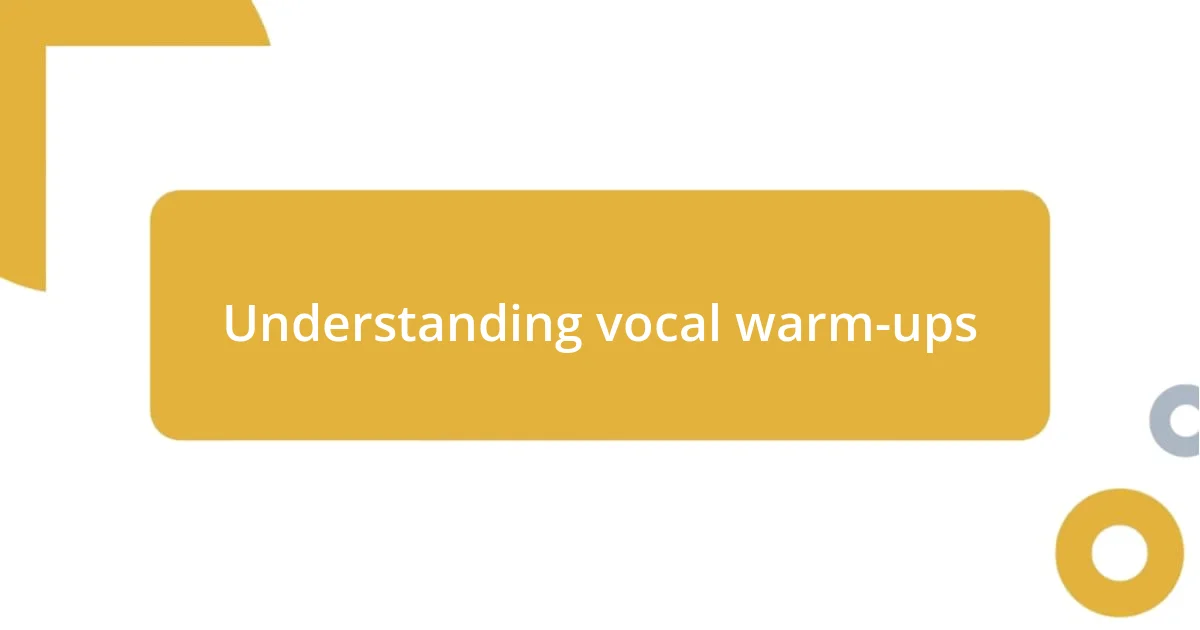
Understanding vocal warm-ups
Vocal warm-ups are essential for anyone who wants to protect their voice and improve their singing or speaking abilities. I remember the first time I skipped my warm-up because I was running late—I felt a noticeable strain in my voice during my performance. Have you ever experienced that kind of discomfort? It’s a stark reminder of why I prioritize these exercises now.
When we warm up our voices, we essentially prepare our vocal cords for the demands they’ll face, whether it’s singing a high note or giving a long speech. I often think of vocal warm-ups like stretching before a workout. Just as those stretches help prevent injury, warm-ups help to enhance our vocal flexibility and strength.
There’s something intimate about the ritual of warming up; it’s a time for self-connection. As I go through my exercises, I focus not just on the mechanics but also on the emotions I want to convey through my voice. Have you ever noticed how your voice feels different when you’re emotionally engaged? It’s a beautiful experience that underscores why understanding and practicing vocal warm-ups is so crucial.
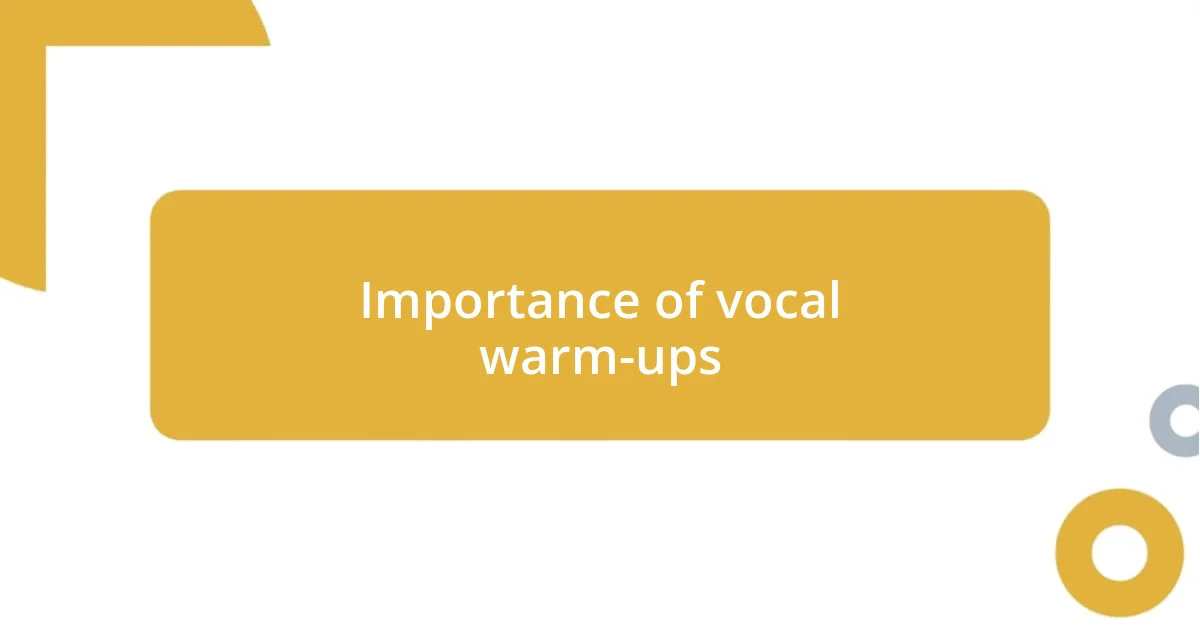
Importance of vocal warm-ups
Vocal warm-ups aren’t just beneficial—they’re vital for preserving our vocal health. I remember a particularly nerve-wracking audition where, in my haste, I neglected my warm-up. The result? A shaky voice and a frustrating inability to hit those crucial notes! That experience reinforced my belief that taking just a few minutes to warm up pays off immensely, both in terms of quality and confidence.
Here are some key reasons why vocal warm-ups are important:
- Prevention of strain: Warm-ups help avoid vocal cord damage by gently preparing them for use.
- Enhanced range: They can gradually expand your vocal range, allowing you to hit higher or lower notes with ease.
- Improved tone quality: Warm-ups help to relax the vocal muscles, promoting a fuller and richer sound.
- Boosted confidence: Knowing your voice is prepared makes you feel more assured during performances.
- Mental preparation: Engaging in a warm-up routine helps to clear your mind and focus, setting you up for success.
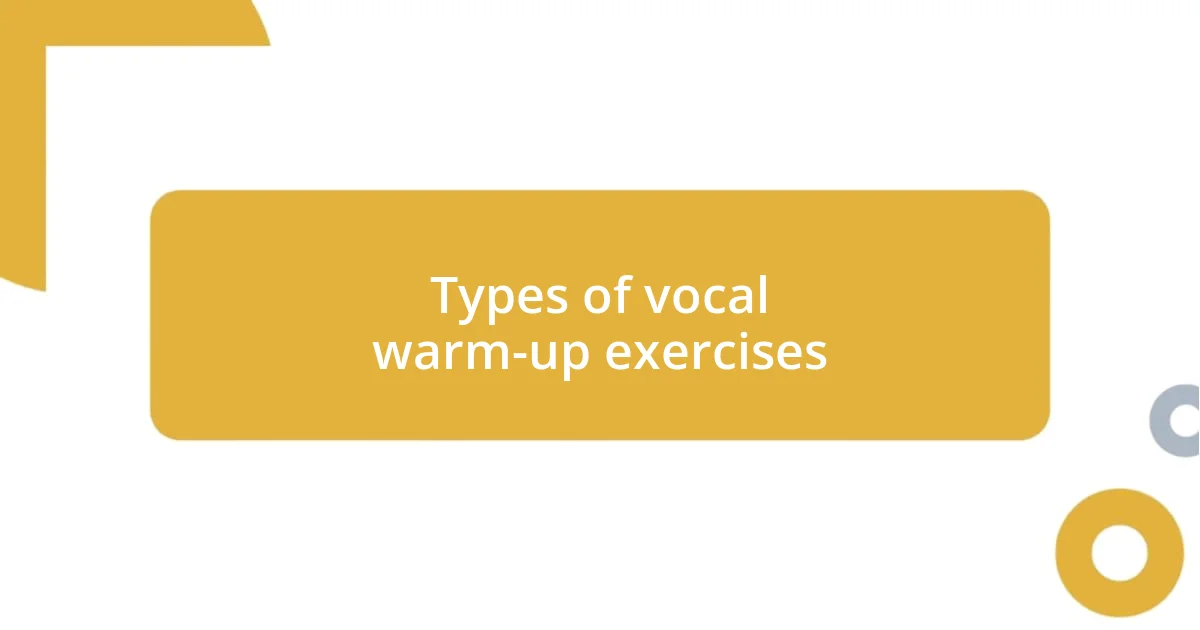
Types of vocal warm-up exercises
Vocal warm-up exercises can be broadly categorized into a few key types, each serving distinct purposes. For instance, I find lip trills incredibly effective; they not only loosen the vocal cords but also promote breath control. By doing these tiny vibrations on a simple “brrr” sound, I feel an immediate release of tension, making it easier to explore my range.
Another popular type includes humming exercises. When I hum gently, I notice how it vibrates through my chest—and let me tell you, it feels wonderful! This exercise not only warms up the voice but also encourages resonance, which is essential for a fuller sound. Have you ever noticed how humming can lift your mood? It’s a perfect way to start my practice sessions with positive energy.
Lastly, tongue twisters can be a fun and challenging warm-up. I love to incorporate them into my routine; they help with diction and clarity. Saying phrases like “red leather, yellow leather” forces me to articulate clearly, ensuring my words flow smoothly during performance. It’s amazing how such playful exercises can seriously prepare you for the stage.
| Exercise Type | Purpose |
|---|---|
| Lip Trills | Loosen vocal cords and enhance breath control |
| Humming | Warm up voice, promote resonance, and uplift mood |
| Tongue Twisters | Improve diction and clarity while engaging the vocal muscles |
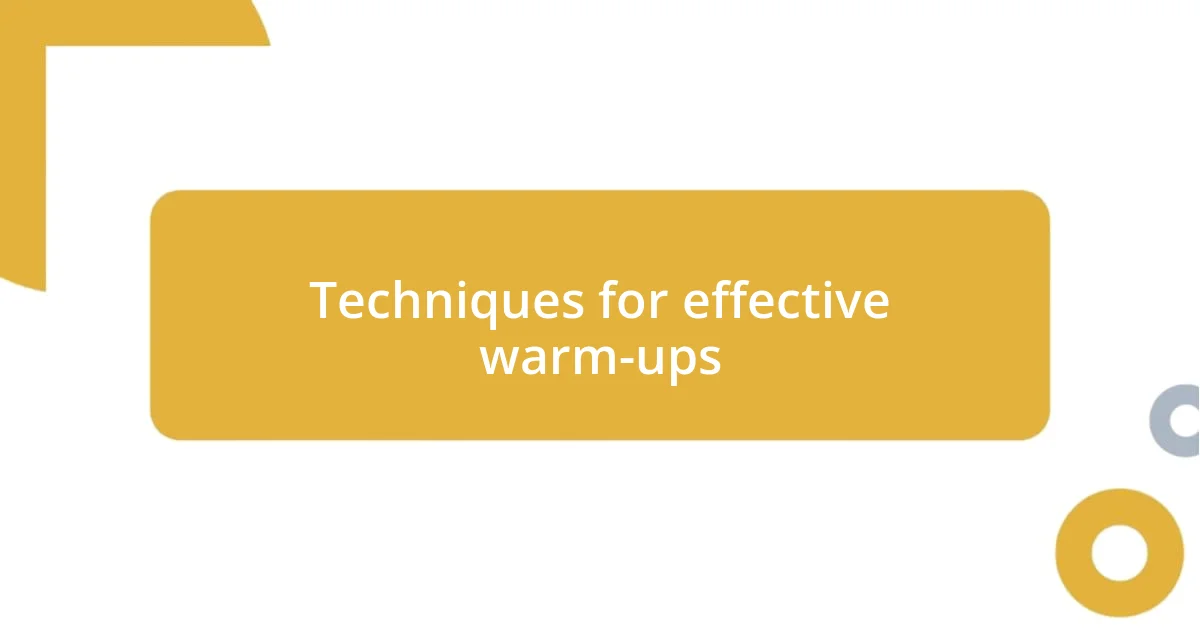
Techniques for effective warm-ups
When it comes to effective warm-ups, I find that starting with gentle sirens—which involves gliding my voice from low to high pitches—really sets the tone for my practice. It’s almost like magic; I can feel the vocal cords coming alive and stretching with each glide. Have you ever noticed how just a few sirens can elevate your readiness for a performance?
Another invaluable technique is the use of vocal scales. I often cycle through major and minor scales, which not only warms up my voice but also helps me familiarize myself with the notes I need to hit. I once struggled with a particular song that had a challenging melody. After several weeks of regular scale practice, I finally felt confident tackling those tricky parts. It’s a simple but powerful method!
Lastly, I can’t emphasize enough the benefits of breathing exercises. Focusing on deep, diaphragmatic breathing not only relaxes me but also ensures that I’m supporting my voice properly. I remember a time when my nerves were racing before a big show, and taking a moment to breathe deeply helped me center myself. It’s a reminder that our breath is the foundation of our voice; without it, we can’t project or sustain notes effectively. What breathing techniques work for you?
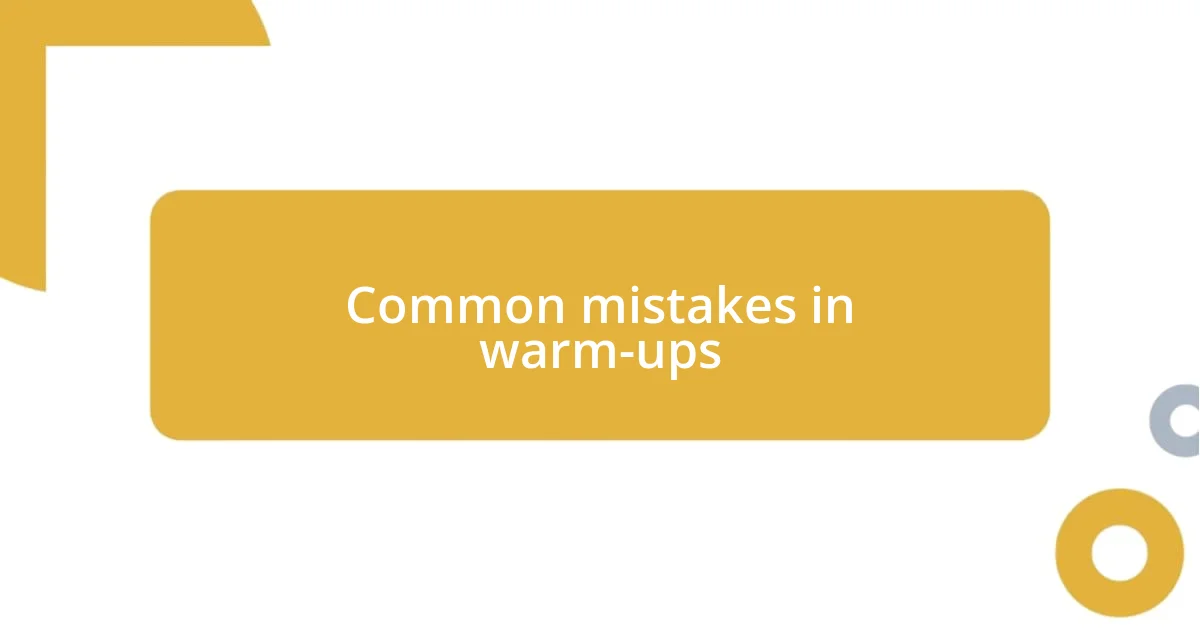
Common mistakes in warm-ups
Common mistakes in vocal warm-ups often stem from the rush to get to the actual singing. I remember a time when I was so eager to dive into my practice that I skipped the initial warm-ups altogether. The result? My voice felt stiff, and I struggled to reach the higher notes. Have you ever experienced that frustrating moment of feeling unplugged? It really emphasized how crucial it is to prioritize warm-ups rather than treating them as a tedious chore.
Another pitfall is neglecting consistency. I used to warm up sporadically, thinking I could catch up on practice later. But after a few shows, I realized my vocal stamina and range dwindled without that regular routine. It’s like any physical training; consistency builds strength. So, if you find yourself in a similar situation, remember: your voice deserves that daily attention as much as anything else!
Lastly, I can’t stress enough the mistake of not listening to your body. There were moments when I pushed through discomfort during warm-ups, convinced that it would pay off. Looking back, I’ve learned that honoring those feelings is essential. If something doesn’t feel right, take a step back. How can I expect my voice to shine if I’m not treating it gently? Embracing a mindful approach to warm-ups has transformed my practice and made my performances more enjoyable.
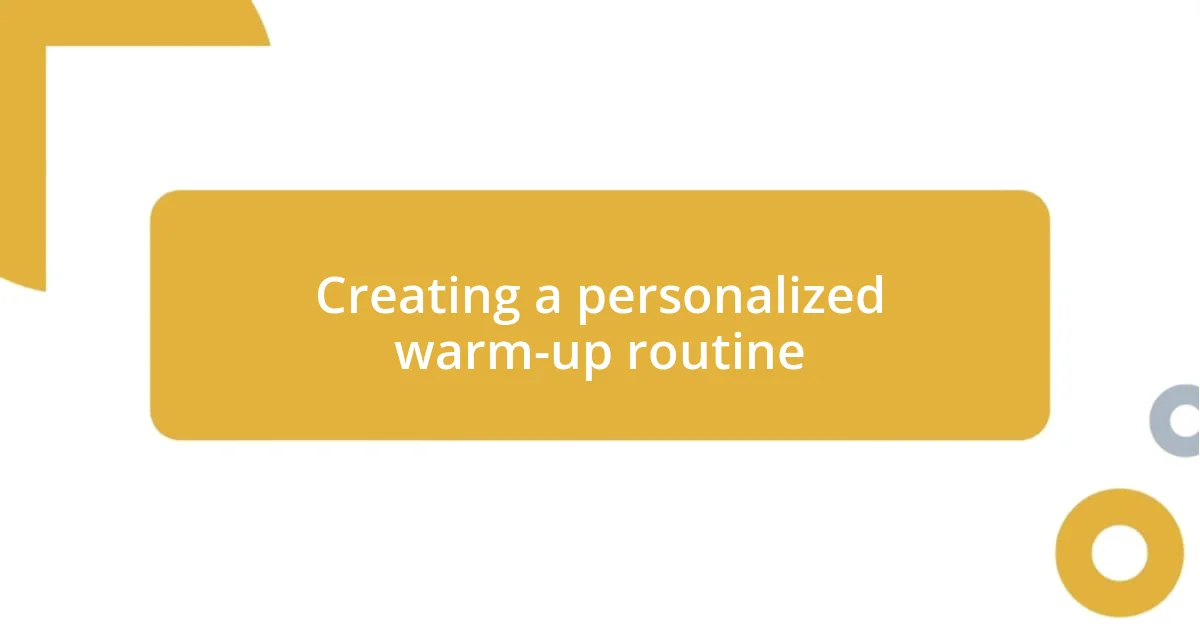
Creating a personalized warm-up routine
Creating a personalized warm-up routine is all about understanding what your voice needs. I’ve learned that tailoring my warm-ups based on my actual singing goals has made a huge difference. For example, before I tackle a high-energy song, I’ll focus on more extensive lip trills and light humming. It’s amazing how honing in on specific exercises can prepare my vocals for exactly what’s to come.
One aspect I often reflect on is the emotional connection to my routine. I’ve experimented with different approaches over time and discovered that incorporating some light stretches or even a calming mantra before I sing can ground me. I recall a day when I felt nervous before a performance; those gentle stretches helped release my tension. Have you ever tried syncing your physical energy with your vocal warm-up? It’s a whole different ball game!
Lastly, don’t underestimate the power of adjusting your warm-up based on how you feel that day. Some days, my voice feels vibrant, while on others, it might need gentle coaxing. Listening to my body has become essential. If I wake up hoarse, I’ll lean into softer exercises, knowing that tuning into those daily variations helps maintain my vocal health. How attuned are you to your body’s signals when warming up?
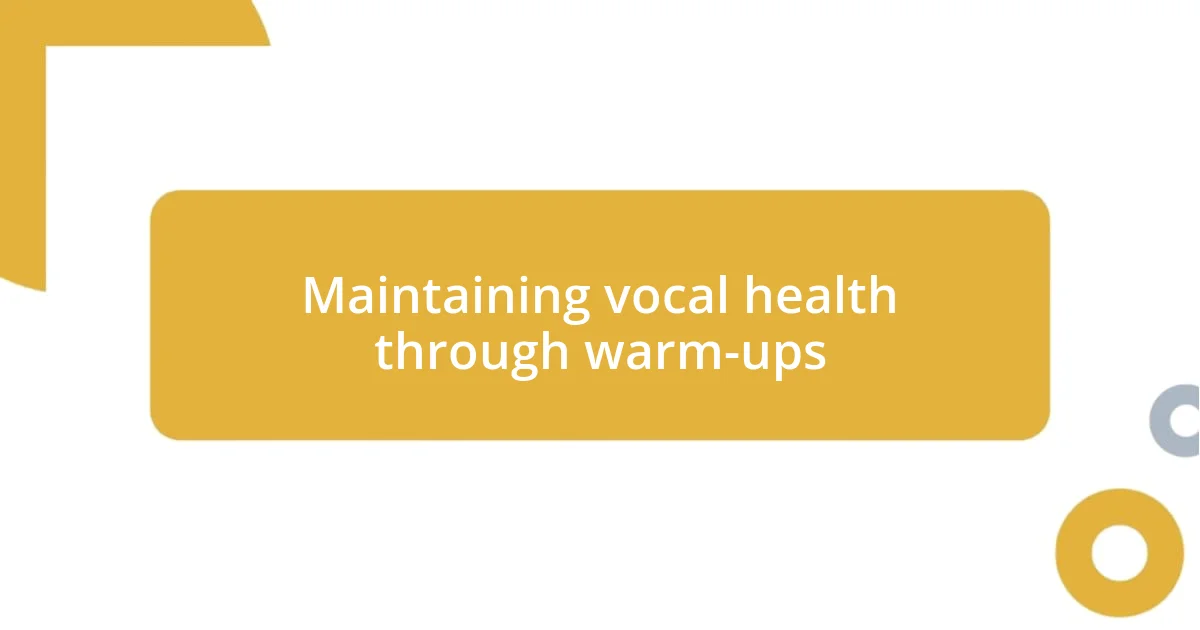
Maintaining vocal health through warm-ups
Warm-ups are not just a formality; they act as a protective shield for my vocal health. I vividly recall an occasion when I didn’t warm up properly before a big audition. My voice betrayed me halfway through, leaving me scrambling to hit the notes I usually nail. Have you ever felt unprepared like that? It reinforced the idea that warm-ups are essential in maintaining vocal function and preventing strain. By investing those few moments at the start, I’m not just preparing to sing; I’m safeguarding my instrument.
In my experience, establishing a routine that incorporates hydration has been a game-changer. I’ve found that drinking warm water or herbal tea during my warm-up not only feels nurturing but truly benefits my vocal cords. It’s fascinating to see how something as simple as hydration can enhance elasticity and reduce tension in my voice. Do you prioritize hydration when warming up? Making it a habit has helped me stay more in tune with my vocal health over the long run.
Finally, let’s not forget about mindfulness. When I’m in a warm-up session, I deliberately take a few moments to breathe deeply and relax before I start. This practice draws my focus inward, helping me connect emotionally with my voice. It was eye-opening to realize how stress could impact my vocal performance. Have you felt tension affecting your singing? By embracing a mindful approach, I’ve found that not only do my warm-ups feel more effective, but they also create a calming space where my voice can thrive.












